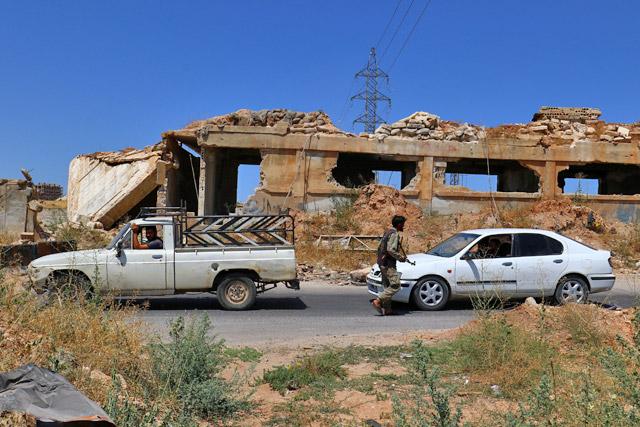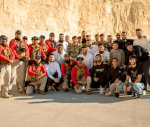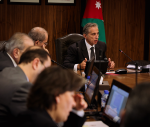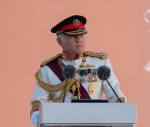You are here
Extremist takeover in Syria's Idlib raises attack prospect
By AFP - Jul 24,2017 - Last updated at Jul 24,2017
BEIRUT — The extremist takeover of Syria's key Idlib province raises the prospect that the region could become the next target of the international participants in the country's complex war.
The northern province is one of only two that have fallen from regime control since the war began in March 2011 with anti-government protests.
Why is Idlib important?
Idlib is the only province in Syria that remains entirely beyond regime control after having been captured in 2015 by an alliance of extremists and rebels named the Army of Conquest.
It borders Turkey and includes the key Bab Al Hawa border crossing, but also sits alongside Latakia province, a stronghold of President Bashar Al Assad's government.
The alliance that captured the province was dominated by Al Qaeda affiliate Al Nusra Front and the rebel Ahrar Al Sham, a key Islamist faction backed by neighbouring Turkey and Gulf states.
In the years since the capture, Al Nusra ostensibly split with Al Qaeda, renaming itself Fateh Al Sham Front and becoming the backbone of the so-called Hayat Tahrir Al Sham (HTS) coalition.
Despite their one-time alliance, tensions have been growing for months between HTS and non-extremsit forces in the province.
These have been exacerbated by fears inside HTS, designated a "terror" group internationally, of a plan to push it from Idlib.
How did extremists seize it?
On Sunday, HTS took control of Idlib city, the provincial capital, after its rivals withdrew.
The shock capture followed a truce after days of fighting between the extremist faction and Ahrar Al Sham.
But it remains unclear if the truce deal officially handed over the city and large stretches of the province elsewhere to HTS.
Better organised and better armed than its rivals, HTS now controls "more than 70 per cent" of Idlib province, according to the Syrian Observatory for Human Rights, a Britain-based monitor.
What does this mean for rebels?
Ahrar Al Sham's control is now confined to just a few dozen towns, areas and villages in southern Idlib, a major downgrade of its influence.
"It's pretty debatable whether Ahrar Al Sham even exists any more and it looks like what is left of it is being digested slowly in the stomach acids" of HTS, said Syria analyst Sam Heller of the Century Foundation think tank.
The faction's subjugation comes after a string of major setbacks for Syria's non-extremist opposition, who have lost large swathes of territory since Russia intervened to bolster Assad's regime in 2015.
"The geographic and political heart of the opposition at this point is in the northwest, and the northwest at this point has just been pretty decisively taken over by this latter iteration of Al Qaeda," said Heller.
Elsewhere, two other key rebel areas in the south and outside the capital Damascus are now under internationally brokered truce agreements being monitored in part by Russia.
What next for Idlib?
HTS is designated a "terrorist" group by the United Nations, United States, Russia and Turkey.
It is regarded as an exremist threat second only to the Daesh group, which is currently facing multiple offensives with international involvement.
Since 2015, Russia has urged opposition supporters to force rebels to part ways with HTS and unite in a fight against extremists in Syria.
With the lines now clearly drawn on the ground between the former allies, Idlib province could become the next target of an anti-extremist offensive.
Rumours have circulated for months about a potential Turkish or even Russian attack against HTS in the province.
Analyst Nawar Oliver of the Turkey-based Omran Centre think tank said he did not expect a "major military operation" on Idlib.
"We may see an escalation of coalition air strikes on some HTS positions," he said, referring to the US-led coalition that is currently focused mostly on fighting the Daesh terror group in Syria and Iraq.
He said regime ally Russia could also step up its air strikes.
"But the regime will not be able to mount a ground attack now because it is fighting on many fronts. It cannot open a new front right now."
On Monday, activists expressed fears about the possibility of fresh heavy air strikes on the province and the prospect of civilian casualties.
And many civilians on the ground also fear a total extremist takeover of the province.
During the clashes between HTS and Ahrar Al Sham, the extremists twice opened fire on demonstrations against their presence, killing one protester.
Related Articles
BEIRUT — Syria's opposition has lost one of its most powerful factions with the collapse of Islamist heavyweight Ahrar Al Sham,
BEIRUT — Militants on Sunday took Idlib in Syria after rival rebels withdrew, strengthening their grip over the northwestern city and its pr
BEIRUT, Lebanon — The fate of Syria's Idlib will depend on Turkey's ability to keep a lid on the extremist-dominated tinderbox and prevent a
















